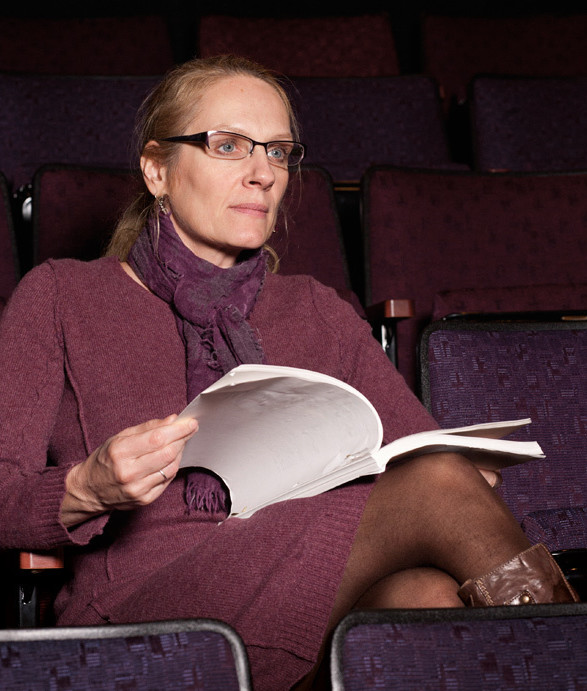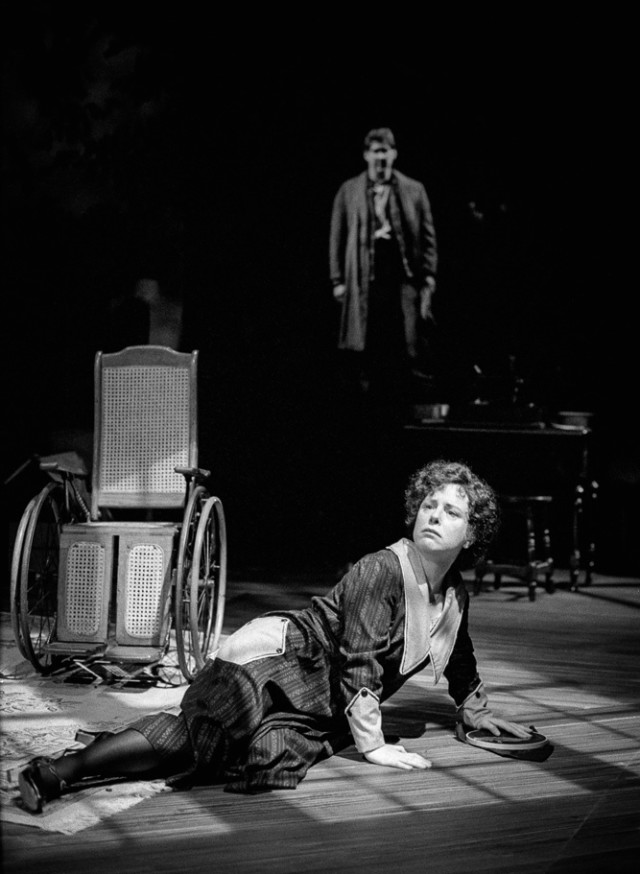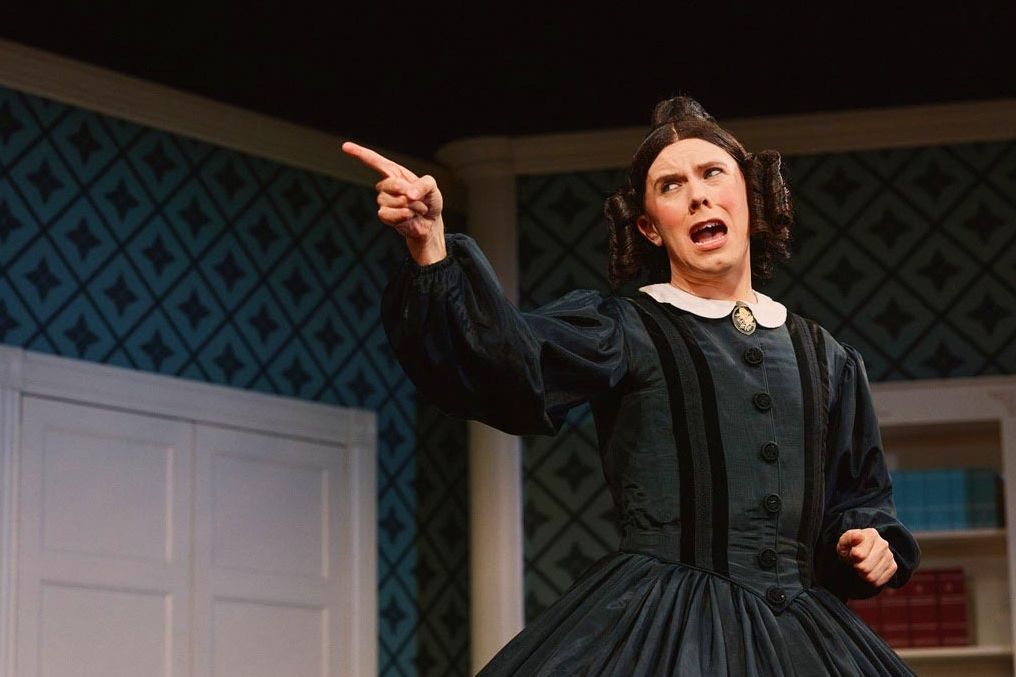Playwright Susan Mach's Double Header

Image: Nathaniel Young
PERCHED ON THE EDGE of a desk at the front of her Clackamas Community College composition class, playwright-cum-teacher Susan Mach leads her students through a discussion of a Rolling Stone article by science writer Bill McKibben. “According to McKibben, the global warming movement has stalled,” says Mach, flinging her arms out wide to make her points. “What does it need?”
“An enemy,” answers one of the 20-plus students, pointing to the oil and gas industry before Mach gets the class to acknowledge that we all buy gas, so everyone is complicit.
“He talked about a model of change,” Mach continues, “the anti-apartheid movement. Do you guys know what apartheid means?”
There’s a pause. A significant pause. Punctuated by a couple of stammers. Finally, a student takes a stab: “Something about, like, a racial thing ... blacks and whites?”
THE LOST BOY
Artists Repertory Theatre
Jan 11–Feb 10
1515 SW Morrison St
A NOBLE FAILURE
Third Rail Repertory Theatre
Jan 11–Feb 3
Winningstad Theatre
1111 SW Broadway
Unfazed, Mach picks up with an explanation, continuing her series of statements and questions, teasing her students down a critical path in response to the article, like Socrates if he favored black dresses and knee-high boots. In 1995, Mach was refining her first play, Monograms, when she enrolled in a Clackamas class herself with author Craig Lesley and first realized that teaching was an appealing way for a writer to make a living. The job suits her, tapping the deep educational impulse that underlies her plays. She achieved early national success with Monograms, but in the 17 years since—as she went through endless readings with no real bites—the classroom has also remained her primary audience.
That’s about to change, in world premieres opening on the same night at two of Portland’s most prestigious theaters. On January 11, her Oregon Book Award winner, The Lost Boy, will debut at Artists Repertory Theatre, and A Noble Failure at Third Rail Repertory Theatre. Although the two seem worlds apart in style and story—the first is the historical tale of a kidnapping and the second a contemporary humanization of the crisis in the education system—like most of Mach’s plays, they each tackle dense social and political issues with the clarion voice of both a teacher and a formidable storyteller.
“She takes a big idea and compacts it, distilling it so that it lives in intimate relationships,” says Scott Yarbrough, the producing artistic director of Third Rail. “She finds a way to, for a lack of better word, theatricalize the story, which is not an easy thing.”
Mach began her playwriting career after college while working as a waiter in Portland. Her first play, Monograms, tells the story of the wheelchair-bound Portland poet Hazel Hall and her struggle with physical and emotional confinement as her work attracted the national gaze. The play was produced in New York and elsewhere, inspiring the New York Times to praise Mach for her “distinctive voice.” From the Clackamas fiction class with Lesley, at age 30 she leapt to Boston University to earn an MA in playwriting. She returned to the community college to teach and went on to write three more plays. There were plenty of staged readings and workshops at places like New York Theatre Workshop and Boston Playwrights’ Theatre, and two fellowships and an Oregon Book Award and nomination from Literary Arts. But only one script, The Shadow Testament, about an infamous cult in Corvallis, made it to even a small full production.
“Being a playwright has to be the toughest part of being a theater professional,” says ART artistic director Allen Nause, who has worked on several of Mach’s scripts since meeting her in 1990 before finally bringing The Lost Boy to the stage. “It’s very, very difficult to get your work produced.”
Indeed, Mach gave up playwriting for a time after her daughter’s birth. Then in 2002, a citywide billboard campaign unfolded for two missing girls, Ashley Pond and Miranda Gaddis. Their bodies were finally discovered at the home of Ward Weaver, who lived on Mach’s route to work. As reporters and gawkers alike turned the site into a circus, she found herself contemplating every parent’s biggest fear—the loss of a child—and what she calls her “compulsion” to write returned. She knew she wanted to make a play about that loss and its exploitation, but decidedly not about “the ugliness” of the Pond and Gaddis killings.

Kelly Brooks as Hazel Hall in the first production of Mach’s Monograms at Portland Repertory Theatre in 1994
Image: Owen Carey
Mach found her narrative path in the 1874 kidnapping of Charley Ross, perhaps the first such crime to become a national circus—almost literally, as P. T. Barnum himself offered a reward for the boy’s return and subsequent enlistment in his circus. Using extensive research to shape the basic plot, including the father’s memoir and the kidnappers’ poorly written notes, she reimagined the story as a “tightrope mystery.” She added a troupe of rascally circus performers trying to profit from the disappearance, as well as the point of view of the mother, who, given the mores of the time, was excluded from all decision making.
Winning an Oregon Book Award last year, Lost Boy caught the attention of Nause. “The play was a page-turner,” he says. “As a director, this combination of a heartfelt story about loss, the circus, and how they interrelate—and how it still resonates today—is really intriguing. As a culture, we have a natural need to know what happened.”
Mach’s inspiration to write A Noble Failure was even more personal. During her 15 years of teaching mostly lower-income students, she has watched the dwindling of her college’s once-wide array of literature courses and the steep decline in the amount her students read, both of which she says reflect larger trends. Then, during a sabbatical two years ago, Mach started researching the education reform movement and was startled by the intensity of the push for privatization. “There’s a certain ideology that the public schools are bad, they failed us, and that the private sector can do better,” she says. “There’s a very cynical thing that’s happening: there’s a lot of money to be made.”
In the resulting play, she modeled her main character, Rosalyn, on the teachers who inspired her—teachers she says would not survive in the current system. Rosalyn struggles to keep a troubled Russian immigrant in school while also dealing with a principal who’s battling to keep the school open as its test scores fall and a consultant working for a private, for-profit corporation that’s co-opting the school.
“I want people to walk away feeling for the humanity of these characters,” Mach says. And she succeeds—in large part through imbuing them all, including the private consultant, with sympathetic motives, but also in part through the script’s sometimes biting, sometimes tender, but always sharp humor. A few of the funnier moments come from her own experience teaching, like when Rosalyn stands before her class, returning papers, and says, “First of all, the Kafka story we just completed is not titled ‘In the Penile Colony.’ Please remember that spell check is not always your friend.”
Mach’s husband, Bruce Burkhartsmeier, calls A Noble Failure her “bomb-throwing play.” As a Third Rail member, he is also part of the arsenal: she wrote the principal’s role for him. After he and several fellow ensemble members participated in a staged reading at the Fertile Ground new works festival last year—the play had won CoHo Theater’s NEWxNW Playwrighting Competition—producing artistic director Scott Yarbrough approached Mach about mounting the world premiere.
“Sue’s play made me look at the situation that we’re facing as a real crisis,” Yarbrough says. “We’ve seen what happened to our health care system when it focused on profit instead of public good, and it seems we’re tipping over that precipice now on education.”
As Mach transitions her Clackamas class from open discussion to peer editing groups, she offers her students some parting advice on weaving real-world facts and history into compelling narrative. “Don’t lose your voice,” she says. “The paper is about you and your thesis; you’re just finding information to back it up.”
Education might be changing, but, at least for this playwright and teacher, the old adage still holds: write what you know.




